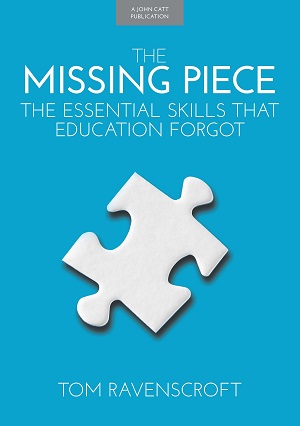Andrew Bargery, Campus and Schools Engagement Leader at PwC reviews ‘The Missing Piece -The Essential Skills That Education Forgot’ by Tom Ravenscroft.
‘The Missing Piece’ focuses on the key ‘life’ skills, what I’d typically refer to as ‘employability’, and asks why they are missing from primary and secondary education, whilst recognising that there are a (relatively small) number of schools that do appreciate their value.
One of the key themes throughout this book is the lack of consistency with the terminology; some examples include soft skills, life skills and enterprise skills. Ravenscroft, a former teacher, highlights the need for a common language.
‘employability’
This got me thinking about ‘employability’, whilst widely used amongst employers and universities, might not be a translatable enough term for students who are at school. Ravenscroft lands on the term ‘essential skills’ and identifies these as listening, presenting, problem solving, creativity, teamwork, leadership, aiming high and staying positive.
There are some great insights into the perspective of secondary education when it comes to implementing these skills, an overview of some of the government initiatives and the challenges that have resulted in some of the initiatives not working.
One example was SEAL (social and emotional aspects of learning). I was surprised at how many schools had implemented this – 70% of secondary and 90% of primary schools. Ravenscroft drills into the detail and refers to his own personal experience of SEAL, which was only ever mentioned once at his school during an INSET session – the rhetoric and the reality.
Ravenscroft also gives insight to when he took some of his students to an investment bank and a law firm and how he was proud (and slightly surprised) by how intuitive his students were with questions.
This demonstrates that inspiration matters. It’s an example of how proactive a Teach First teacher (which Ravenscroft was) can be.
‘essential skills aren’t innate’
Ravenscroft writes of the view that in some quarters essential skills are un-teachable. However, his research shows that these claims are totally unfounded and that essential skills aren’t innate.
This led me to think that all teachers, regardless of the age of their students, should read this book. The importance of essential skills in the student journey should be appreciated by all staff working in primary and secondary education.
The book highlights what little spare time a teacher has. Ravenscroft emphasises the need for discrete time in the timetable and compares essential skills to literacy and numeracy, the value/importance they have in society and the fact that they all need constant nourishment and reinforcement throughout school life.
George Sampson’s quote (from 1922!), “every teacher is a teacher of English” is referenced. I absolutely agree that this level of engagement needs to be replicated with essential skills for them to be fully embedded across the UK.
Resources
There are a number of resources available. Employers (including PwC) offer online toolkits/e-learns, but Ravenscroft points out that teachers don’t currently have the time to use them in the right way (Toby Young might disagree!). Therefore formally embedding dedicated time (and training) is critical to ensuring students are equipped with the right skills.
An interesting suggestion was to build essential skills into teacher training. However it highlighted the challenge of its fragmented nature; the varying routes and providers. Perhaps we could try and ensure that these become more standardised, particularly when it comes to essential skills, to ensure they are covered in all training routes.
One of the skills that struck me as missing from the list of essential skills was digital literacy.
There was an interesting piece on how the relevance of certain skills can change. While learning how to use Twitter may currently be relevant, this is very likely to change over time.
That said, a broader ‘digital literacy’ skill can always be adapted to cover what’s relevant at any given period of time. Ravenscroft recognised the importance of IT and the deficit in the training that schools deliver – some of his students didn’t even know how to save on a computer.
At the time of writing, the government has appointed a new Minster for Education, which makes me wonder what new initiatives are around the corner and throws up the question of what value the next round of changes will have.
A Scandinavian model, where education isn’t included in any political party’s manifesto, is still a pipe dream. But, Ravenscroft’s message around the importance of a shared language is critical if we are to see positive future changes around essential skills.


0 Comments